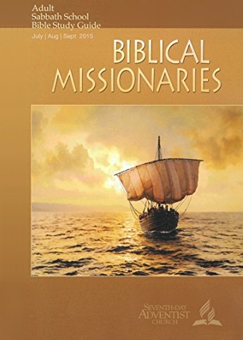|
||||||||||
The Sabbath School Bible Study Guide is published by Pacific Press Publishing Association, which is owned and operated by the Seventh-day Adventist church. The current quarter's edition is shown above.
Official Adventist Resources for week 12:
Easy Reading Edition Study Guide
Search the Complete Published Ellen G. White Writings
Support this project
If you would like to support this website, please click on the following link to donate online or you may mail your check to: Life Assurance Ministries, PO Box 905, Redlands, CA 92373. Mark your check "Bible Studies."
Third Quarter 2015 July–September)
COMMENTARY ON THE BOOK OF LUKE
Week 12: September 12–18
COMMENTARY ON PAUL: MISSION AND MESSAGE
Following is a combined commentary on the material included in the Bible Study Guide with references as necessary to the supplemental passages included in the E. G. White Notes for the Sabbath School Lessons.
Note: Unless otherwise stated, all biblical quotes are from the English Standard Version (ESV).
Commentary
By today’s organizational standards, Paul’s mission efforts were poorly designed, ill-equipped, and often met with tragedy. Paul often had no idea where he would be any given day, much less a year away. He had no denominational conference office to “call” him to any mission field or provide him with money, supplies, or directives. The council in Jerusalem believed in his work, but seldom could reach him to give him direction. In fact, they needed help from Paul and the Gentile churches (Acts 11:29-30).
Even so, the gospel was carried, by God’s direction and provision, throughout most of Europe and the near East in less than a century. The apostles and early Christians were driven by the Spirit’s direction and power, giving them a passion for the glory of Christ’s gospel, in spite of their “lack” of planning. The gospel proclaimed by the early church was the same gospel, wherever they went, to Judea, Samaria, or the end of the earth (Acts 1:8). Paul reminds the Corinthian Gentiles of the specific content of that gospel in 1Cor. 15:1-3. Christ died for our sins, was buried, and rose again the third day, all according to the scriptures. That is the gospel for all times and all peoples.
The Lesson rightly says that Paul would use a different “entry point” to introduce the gospel, based on the culture of his audience. However, they claim that the early church used signs for the Jews while saving the “logical elegance” for the educated Greeks (Sunday’s Lesson). It would also be a grave mistake to present a gospel without the Jewish scriptures to show the prophecies and laws that made the New Covenant meaningful. If we divorce the gospel from that covenantal history, we take away its foundation. Without that foundation, the message of Christ becomes just another interesting myth that one can accept or reject based on one’s cultural context. Using all of scripture, with its prophecies, miracles, and its elegant logic, is to proclaim Christ is proclaiming the “whole counsel of God” (Acts 20:24-27).
The resurrection of Jesus is a key piece of that gospel, and it gives hope to every believer that our deaths are not in vain. All Christians can agree on this. This Lesson is emphatic, however, that for the Christian, death is “sleep”, meaning that between the moment of death and resurrection, the believer has no existence at all. Let’s be clear. The word “sleep” used in this Lesson is really a euphemism. Sleep implies the continuity of unconscious life and the subconscious existence of the person. During sleep, personhood and life are not lost. The Bible is not giving us a euphemism. Yet according the Lesson’s teaching, “sleep” really means annihilation of the person. Resurrection, therefore, is a recreation from nothing of the deceased person by God. There is no continuity of the person’s spirit, mind, or personhood.
The Lesson asks, “If the dead in Christ are already in heaven, what is Christ talking about here?” It is assumed that bodily resurrection would be meaningless if the believer’s living spirit went to be with Christ at death. However, Paul anticipated that argument when he told the Corinthians why he would rather be “clothed” instead of naked and without a body:
We know that while we are at home in the body we are away from the Lord,7for we walk by faith, not by sight.8Yes, we are of good courage, and we would rather be away from the body and at home with the Lord. 2Cor. 5:6-8
Unconscious dirt with no spiritual life has no interest in being “at home with the Lord.” There is great comfort in this passage, knowing that once we are united with Christ, we are never separated again. Martha, Jesus’ friend, thought like an Adventist, and Jesus had to explain that because of who He is, the life He gives never ends:
Martha said to him, “I know that he will rise again in the resurrection on the last day.” Jesus said to her, “I am the resurrection and the life. Whoever believes in me, though he die, yet shall he live, and everyone who lives and believes in me shall never die. Do you believe this?” John 11:24-25
As Adventists, we are stubbornly unable to read this passage and see anything different than what we were taught. Only pagans and Apostate Protestants thought that God could actually give us eternal life that never dies. I pray that like Martha, we can believe the words of Jesus and his apostles, that eternal life means just that, something that can never be taken away from us. He has promised. Do you believe this?
Copyright 2015 BibleStudiesForAdventists.com. All rights reserved. Revised September 18, 2015. This website is published by Life Assurance Ministries, Camp Verde, Arizona, USA, the publisher of Proclamation! Magazine. Contact email: BibleStudiesForAdventists@gmail.com.
HOME | 2015 | THIRD QUARTER | WEEK 12

